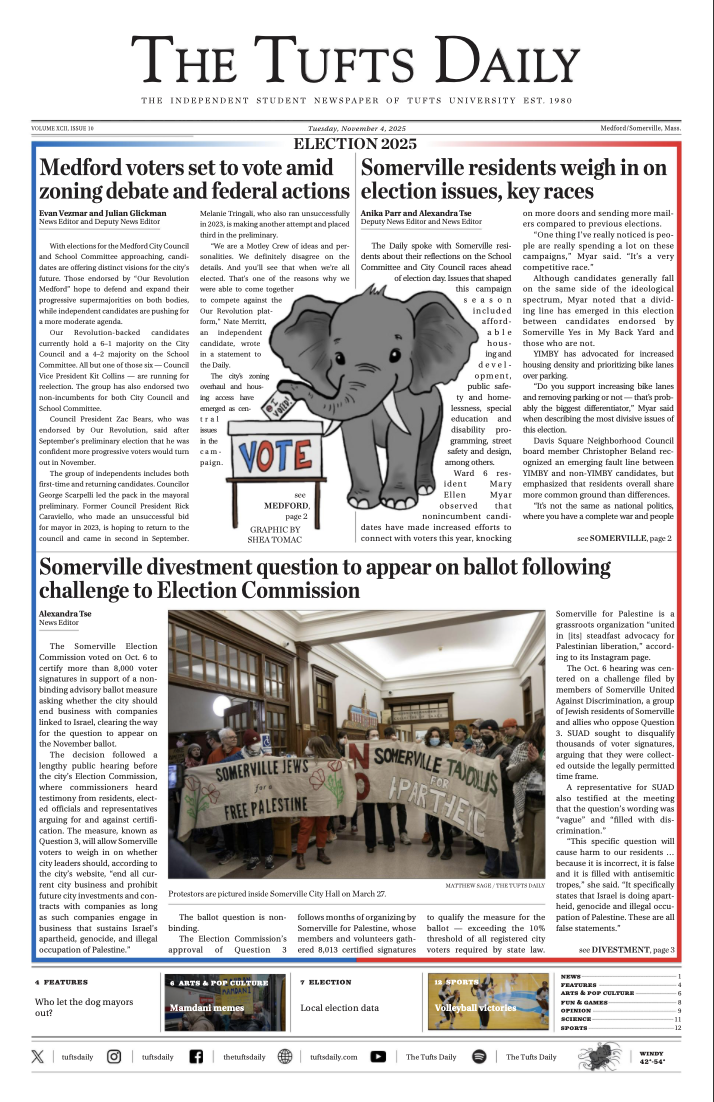According to Martin Sherwin, conflicts in nuclear warfare are just as relevant today as they were in the days of the man who started it all - J. Robert Oppenheimer.
Sherwin, professor of History at Tufts, presented his award-winning biography of Oppenheimer to students yesterday in honor of the Tisch Library's tenth anniversary.
The book, "American Prometheus: The Triumph and Tragedy of J. Robert Oppenheimer," which Sherwin co-wrote along with biographer Kai Bird, is the winner of the 2006 Pulitzer Prize for biography and the National Book Critics Circle Award.
Sherwin dedicated his book to Jean Mayer, the President of Tufts from 1976 to 1992, who he said made possible much of what he accomplished at Tufts.
"I have seen this university transform from a small local New England college to the international university it is today," said Sherwin.
In turn, his brief synopsis of the biography focused on Oppenheimer's "transformations" throughout his life.
Sherwin traced Oppenheimer's path through his childhood to his position as manager of the Manhattan Project in Los Alamos, Mexico, the United States' secret nuclear program, and finally to his role as an opponent of nuclear proliferation. Despite early failures as a professor and manager, Oppenheimer was relentless in his drive for success.
Oppenheimer's "ability to transform himself in many ways explains his ability to do what he did in Los Alamos," Sherwin said.
The talk was supplemented with a reading of some of Oppenheimer's childhood letters and one of his speeches.
After completing a book on the history of the atomic bomb in 1975, Sherwin said that the biography on Oppenheimer was "an obvious choice."
"I was fascinated by him," he said. Then "someone suggested, why not do a biography of Oppenheimer? And that really stuck with me."
Sherwin began writing the biography in 1980, the first year of his employment at Tufts.
Sherwin admitted that he initially thought the biography would be "easy."
"I told my editor it would be finished in five or six years," he said.
Twenty-five years later, he admits that he "found biography immensely more difficult than writing a history." He even equated biography with prison, saying that "you are locked in to this person's life."
Sherwin stressed the necessity of psychoanalyzing your subject rather than liking, admiring, or identifying with that person.
"One of the things that was necessary to do was to put your subject on the couch," he said. A biographer has to "get to know your subject from the inside out."
This intimate analysis of Oppenheimer at times was problematic for Sherwin. A father of Tufts graduates, he described Oppenheimer as an utter failure as a father figure. At times like these, "it was hard to connect with [Oppenheimer] on a human level," he said.
Sherwin related aspects of Oppenheimer's biography with current events surrounding nuclear warfare.
"People thinking about the issue outside of the box are necessary," Sherwin said. "I think we are heading down a steep and very slippery slope unless we have an administration that begins to reverse the American commitment to nuclear weapons," he said.
In response to a question regarding his book's position on George W. Bush's reading list, Sherwin remarked, "I got as many emails about that as about the Pulitzer Prize."
"You have to understand there were lots of pictures with captions," he joked.
On a more serious note, Sherwin believes Bush would be prudent to consider some of Oppenheimer's solutions to problems of nuclear proliferation.
He said that America's dealings with nuclear weapons will be "seen as our country's most significant failure." Unfortunately, we have "taught the rest of the world" to view nuclear weapons as a symbol of respect.
Through the eyes of Oppenheimer, Sherwin said, the only solution for the problems of nuclear proliferation is diplomacy.
"North Koreans want respect and they want to be talked to," he said. "Talk is cheap but it can also be very useful and can lead to good solutions."
Sherwin, however, sees hope for the future. "Congress responds to public opinion," he said.
The talk was co-sponsored by Friends of Tufts Libraries and Tufts' History Department.





